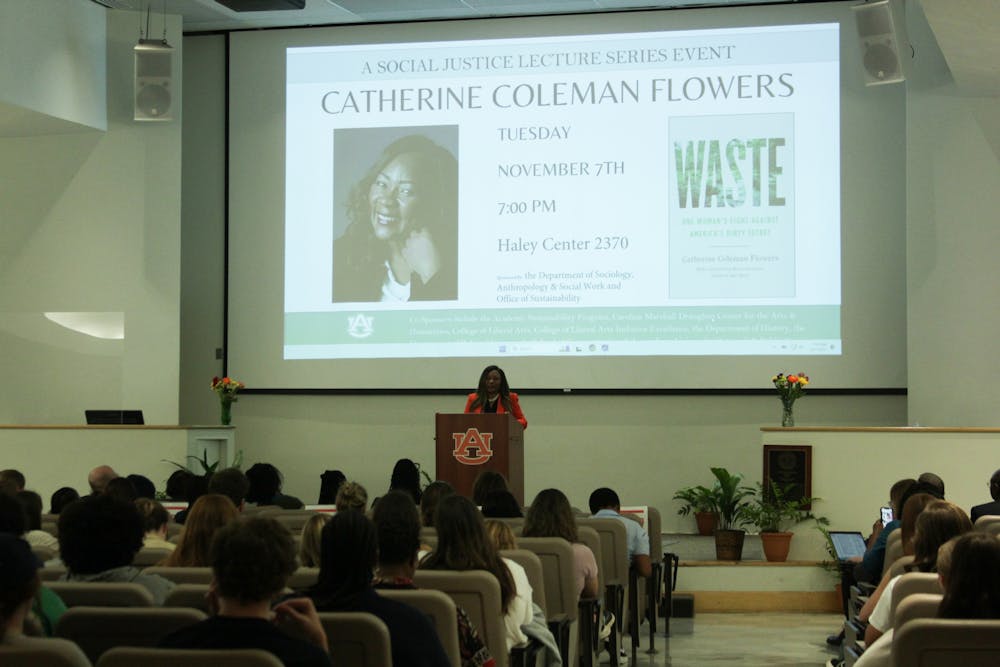Environmental and climate activist Catherine Coleman Flowers spoke to Auburn students and faculty the evening of Nov. 7 at a lecture sponsored by the Department of Sociology, Anthropology & Social Work and the Office of Sustainability. The lecture, held in the Haley Center, revolved around Flower's book, "Waste: One Woman's Fight Against America's Dirty Secret."
The book, published in 2020, chronicles Flowers' life from her childhood to her environmental advocacy, the importance of sanitation and how it is affected by geographic, racial and systemic prejudices. "Waste: One Woman's Fight Against America's Dirty Secret" was listed on Smithsonian Magazine's list of Ten Best Science Books of 2020 and led Flowers to receive the MacArthur "Genius" grant.
Dr. Carole Zugazaga, chair of the sociology, anthropology and social work department, began the lecture by speaking about the importance of unity in the fight against climate change. She explained the lecture series aims to bring speakers to campus so they can share their knowledge and expertise to help inspire the community to engage in rigorous environmental and social justice research.
After Zugazaga spoke, Office of Sustainability Director Michael Kensler went to the podium and gave a brief introduction about Flowers. During his introduction, Kensler quoted one of his favorite books, "Blessed Unrest" by Paul Hawken.
"There can be no green movement unless there is also a black, brown and copper movement," Kensler read before welcoming Flowers to the stage.
In a bright orange blazer, Flowers thanked everyone for attending. She joked to the audience that she didn't mean to match the Auburn color but was happy she did. Flowers explained she felt blessed to speak at Auburn because there are few universities in Alabama she's publicly spoken at.
Flowers' exposure to activism began when she was a young girl in her birthplace of Birmingham, Ala., where she watched her mother march in support of civil rights. Around the age of 5, Flowers witnessed students, youth and adults fight for Black and civil rights and the 1963 bombing of 16th Street Baptist Church that killed four young African-American girls.
For a brief time, Flowers and her parents lived in Montgomery when she was a little girl. One day, while she was in class at her elementary school, Flowers heard over the intercom Dr. Martin Luther King Jr. had died.
After Montgomery, Flowers' family moved to her father's hometown in Lowndes County, Alabama. There, Flowers described that, unlike Birmingham and Montgomery, Lowndes was a family-focused community. She joked to the audience that if she ever got stuck on the highway from Selma to Montgomery, she could go to the houses next to the highway for help because they were her family members.
In Lowndes, Flowers said she saw how genuinely fierce her parents were in activism. She lived the rest of her childhood and teenage years in Lowndes until she went to university, pursued a career as a geography teacher and advocated for civil rights.
After, she described her childhood and development in her book where Flowers writes about her return to Lowndes County and the sanitation issues she discovered.
In Lowndes, a county that is mainly Black, Flowers noticed a lack of proper sewage disposal and filtration systems, which made the people of the county sick. She explained that in the rural county, many homes had cesspools or septic tanks, which neither adequately disposed of or contained human waste.
She spoke about times when the waste would flow back into the homes due to rain and the use of outhouses. She also explained the lack of insurance coverage for those who purchased septic tanks and how waste liability would transfer from the city to homeowners with septic tanks.
Two of Flower's long-time friends sat in the crowd, Randolph Strickland and Tony Holland, both Auburn alumni. Strickland, who is from Lowndes, and Holland, who is from Macon, both described similar waste situations occurring in their rural towns.
Flowers, who named the widespread sewage outbreaks across the nation "waste wars," explained that local and national media wouldn't pick up the story because it wasn't a "sexy" enough issue, although it devastated American homeowners.
However, that didn't stop Flowers from fighting the waste war. She conducted house-to-house surveys with her team and took water, soil and blood samples of citizens of Lowndes County.
It took three years for The Guardian to evaluate and validate Flowers' evidence of tropical parasites found in Lowndes County's water and soil. Once The Guardian broke her story in 2017, Flowers gained national and international recognition.
Toward the end of the lecture, Flowers urged students to join the environmental fight by going to her organization's website, The Center for Rural Enterprise and Environmental Justice (CREEJ). She encouraged Auburn engineering students to go to rural communities to work with those in the community who see the problem and may know how to repair the problem.
After her lecture, the faculty opened the floor for questions. There, students and faculty asked questions regarding aid and repair to rural communities, gaining trust in communities that experience environmental injustice and how to be a fierce environmental and social activist.
Once questions wrapped up, Well Red, a local coffee shop, sold copies of Flowers’ book. Flowers also spent time after the Q&A to speak with audience members, sign copies of her book and take photos.
"We're at a time right now that's very concerning, there's a lot of division and hate in world," Flowers said at the end of the Q&A. "But there is also hope."
Do you like this story? The Plainsman doesn't accept money from tuition or student fees, and we don't charge a subscription fee. But you can donate to support The Plainsman.
Michaela Yielding is a senior in journalism currently serving as the news editor. She has been with The Auburn Plainsman since fall 2023.





